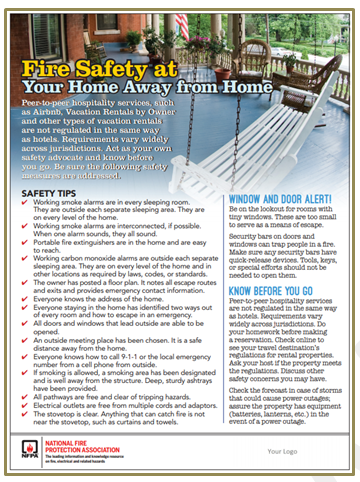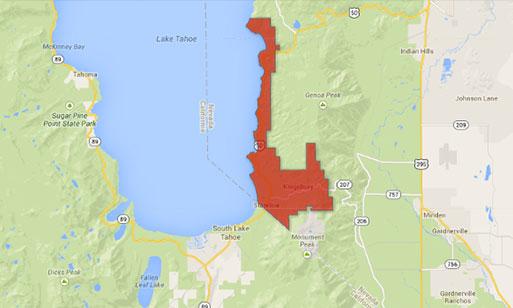Frequently Asked Questions (FAQ)
for VHR Property Owners & Managers
Have questions about VHR inspections? We’ve got answers.
Q: What should a homeowner expect during a VHR inspection?
A: A Fire Prevention Inspector will conduct a thorough walkthrough of the entire property, inside and out utilizing a fire and life safety inspection checklist. The owner or property manager must be on-site for the inspections, which will take forty-five (45) minutes to an hour.
Learn more about Fire & Life Safety Inspection for VHR.
Q: If the VHR owner will not be able to be present at the inspection, what paperwork is needed to authorize someone on their behalf?
A: Submit the Delegation of Authority form at least 48 hours prior to appointment time to Tahoe Douglas Fire.
Q: What is the fire extinguisher requirement for a VHR property?
A: A fire extinguisher is required on each level; Minimum size for fire extinguishers is 2-A: 10-B: C. Extinguishers must be properly mounted and serviced once per year (IFC 903(1)).
Q: What is the requirement for an emergency escape ladder for a VHR property?
A: An emergency escape ladder is required in each bedroom whose egress window is greater than 16 feet above grade (IFC 1030.1).
Q: What is the requirement to monitor fire alarms on VHR property?
A: Monitoring is required for VHRs having any of these conditions:
- Three (3) levels
- Ten (10) or more occupants
- Attached dwelling units/structures (i.e. apartments, condominiums, duplexes or townhouses)
VHRs are required to have a monitored fire alarm system registered with the Compliance Engine software program. The system must be installed and monitored by a 3rd party alarm company licensed in the State of Nevada by the State Fire Marshal. Licensed local vendors include, but are not limited to: Mountain Alarm Fire & Security, NU Systems, Inc., Security Lock & Alarm, Inc., or any Nevada licensed fire alarm company. Please click the link below to verify a company is a legitimate qualified Fire Protection provider in the State of Nevada : Click here for verification
The alarm system shall be registered with the Compliance Engine by the alarm company that provides the system. Many of the alarm systems are wireless and do not need to be hardwired. A cellular and radio signal monitoring is acceptable. (Note: Host Compliance, which tracks VHR permits, is a different program from Compliance Engine, which tracks the alarm monitoring system).
Web-based programs, i.e. Nest or Simply Safe, are not approved.
Q: What are the recommended smoke or carbon monoxide alarm locations for a VHR property?
A: VHR owners must:
- Install a functional carbon monoxide alarm on each level in the home or property
- Install a functional smoke detector (wired or wireless) in each bedroom and adjoining hallways on each floor
- Check alarms after each rental to ensure they have not been tampered with
- Test alarms monthly, replace batteries every six (6) months
- Replace smoke alarms every ten (10) years, or sooner; carbon monoxide alarms every five (5)- ten (10) years, varies by manufacturer
Learn more about recommended locations for smoke alarms.
Q: Who cleans and inspects wood-burning appliances?
A: Chimneys or wood-burning appliances are required to be cleaned and inspected annually (IFC 603). Local resources:
Tahoe Chimney & Fireplace
http://www.tahoechimney.com/
Firewise Chimney Sweep & Inspections
530. 545.9564
Sooty’s Chimney Sweep
530.545.3048
Tahoe Douglas Fire is not advertising for these particular vendors but is recommending the use a licensed, experienced professional.
Owners of properties with wood-burning appliances should provide an ash can with instructions for proper disposal and ensure that firewood is stored safely (30 feet from a structure or completely covered by a fire-rated tarp)
Q: What is recommended to allow for the Fire Department to access your home during an emergency?
A: Residential Knox Box allows first responders to enter the home quickly, makes the re-securing property easier and faster, and reduces the need for forced entry and related property damage. These boxes are specifically coded for Tahoe Douglas Fire. Learn more about the Knox Residential box.
Q: What is an acceptable barbeque to use for a VHR property?
A: A LP-gas open-flame device which is set back from combustible materials and structures per building and manufacturer's instructions. (IFC 308.1.4) An electronic BBQ is acceptable. No charcoal grills or charcoal grills prohibited.
Q: What is the requirement for sound monitoring for a VHR property?
A: The fire district does not require sound monitoring. However, per Douglas County Code, no noise is allowed after 10 pm. According to NRS 203.010, disturbing the peace will be enforced by the Douglas County Sheriffs and Code Enforcement.
Recommended resources:
- Noiseware - Privacy Safe Noise Monitoring
- Optimize my BNB - Noise Monitoring: NoiseAware + Party Squasher
- Airbnb - Keep your space party-free
Q: What are the requirements for a defensible space for a VHR property?
A: The fire district is located in a high hazard wildfire environment which requires a defensible space evaluation (DSE) for all homes. These DSEs provide the homeowner with information on to reduce wildland fire risks on the exterior of the home and surrounding property. Exterior smoking locations should be clearly marked with cigarette disposal cans with lids.
Learn how to create and improve a defensible space.
Schedule a defensible space consultation.
Q: What are the steps for Emergency Preparedness?
A: Your temporary guests need basic information to safely evacuate your home during an emergency. Please provide:
- An Escape Plan for vacation rentals with occupancy of 10 or more, with routes out of building and meeting locations (as seen in hotel rooms).
- A Wildfire Evacuation Plan with instructions about road routes, evacuation shelter locations, and emergency radio station channels.
- Standard OSHA Earthquake Preparedness and Response as the Lake Tahoe Basin is on a major fault line.
- Learn what to expect during a wildland fire, before a wildland fire occurs, and during a wildland fire.
- Learn more about fire preparedness and response at LivingWithFire.
 Renting a VHR?
Renting a VHR?
Be an informed guest
Peer-to-peer hospitality services, such as Airbnb, Vacation Rentals by Owner, and other types of vacation rentals are not regulated in the same way as hotels. Requirements vary widely across jurisdictions. Act as your own safety advocate and know before you go. Be sure the following safety measures are addressed.
Read more to Learn Safety Tips from Tahoe Douglas Fire Protection District's Prevetion Team.

